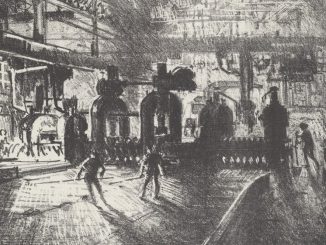![Terry Vlisidis (@vlisidis), Untitled [Unsplash]](https://www.thenasiona.com/wp-content/uploads/2020/02/Terry-Vlisidis-@vlisidis-Untitled-Unsplash-1030x438.png)
This is the story I wouldn’t tell you when you were alive. The only time I attempted suicide was by accident. They’re always asking that question during those shrink meetings: do I have a history of suicide? When I tell them yes, their head cocks to the side, pen at the ready. It’s as if they get off on this stuff. They assume that’s where the scars come from—some 14-year-old blasting screamo music, whose soul is as black as her eyeliner and who doesn’t know shit about shit yet. They see red. The reality of the event seems beige in comparison. And it was about the third or fourth counsellor in that I realised these sessions for my Post-Traumatic Stress Disorder (PTSD) weren’t as therapeutic as the psychiatric nurses previously advertised.
Now, I take to pints and poetry.
‘Gorgeous, you ready to go on next?’ Steve asks. I nod and down the Stowford. Heat rises beneath my skin in part from all the ciders and in part from the crowd. It’s a decent showing of about 20 on the mic and another 20 just spectating, crammed into the attic of the Railway. Most of the people are first-timers, or at least, they’re people I haven’t seen here before, so in a way, that makes them first-timers.
My legs have started their incessant twitch: the updownupdownupdownupdown bounce they do when I’m nervous. Or excited. Or both. Usually both. A palm finds its way onto my knee, fingers giving a reassuring squeeze as a reminder that I don’t have to do this; I want to do this. That I can quit at any point, turn tailbone and trot on out and no one would be any the wiser, but I don’t want to run. I’ve always chosen fight over flight. So my hand finds its way to Jim’s and I squeeze back, and in that moment he and I are inside of each other, having an entire conversation in hand-squeezes-and-knee-jiggles Morse Code.
Steve gives me an introduction I don’t deserve. He’s always doing that: saying my words are better than they actually are. He uses words like rapturous. But he’s the best host I’ve seen at spoken word events—here or in the States—and he’s part of the reason why Poetry Platform’s is my favourite open mic. I make my way up to the stage, adjust the stand, give the poem an introduction.
The first problem with having PTSD is that it is a clusterfuck of mental illnesses, the jack-of-all-trades, the variety pack, including but not limited to: depression, anxiety, insomnia, hallucinations, flashbacks etc. The shrinks teach people grounding mechanisms to help alleviate all the symptoms and I ground myself by remembering things: presidents, digits of pi, what I ate for breakfast, happy times, sad times. The second problem with having PTSD—and the main problem of remembering things as a grounding mechanism—is that I remember things you don’t want to remember.
I take a deep breath, smell the tangs of sweat and alcohol and when I speak, the voice doesn’t sound like my voice. It’s a voice that sounds like it’s under water and it’s drifting away and sinking.
Remember sunshine sparkling a cross cloudless skies like diamonds…
It was December 2002 when we started redecorating my room. We thought that would help with the nightmares. Do you remember? How I couldn’t sleep in my bedroom for months because it wasn’t right? How I was so mature now at the age of eight? I guess that was the downside of watching so many home improvement television shows: kids nagging about ‘crown moulding’ and ‘accent walls’ and ‘natural lighting’ until you were so irritated you slung on your overalls and got painting. Well, I don’t remember you being irritated (I was eight and memories are such tricky bastards), but I know if it were me, I’d be annoyed as hell. Maybe you just had the patience of Job, or maybe it was just easier to be patient with your own child rather than the many employees at your recently-divorced job. Your ex-job. Your job you quit because of what happened the previous summer.
We were ripping up the sky-blue carpet—by ‘we’ I mean ‘you’. You were ripping up the light blue carpet in my bedroom closet when you asked: where’d this stain come from?
What? (I pretended I couldn’t hear you)
This stain. There’s a big bleach stain in your closet. Where’d it come from?
I dunno. It’s always been there, I said.
Of course, it hadn’t always been there. It was only about four months old: a big stain about the size of a basketball, bleeding out into the carpet so that the edges of it were a putrid brown. Sometimes I thought it would swallow me—swallow me right up and I’d fall into the stain like a rabbit hole and I’d disappear. Poof! Just like that. Of course, it never did, even if I wanted it to, even if I needed it to.
It happened in August 2002, I think, but maybe it was July. It was probably July. If I’m honest, I’m not sure when it happened, really. Just that it was summer and it was hot, and that the summer heat made the smelt Gramma Connie cooked smell and stink up the whole house. That was the summer of the Saplan family reunion, and that was the summer I learned why all reunions contain false happiness, wherein individuals feign interest in others’ lives and wait to brag about their own accomplishments and complain about their woes. Papa (that’s what we called Grampa) was sick by then. Not physically sick—this was before his colon cancer—but sick upstairs, in the head. I like to think his memory was a Rubik’s cube, all squares and colours he couldn’t line up into the correct formation, like he could remember all the algorithms, but not when to use them.
In an ideal world, we’d all die early. As in before Alzheimer’s or dementia set in. I’m not sure there’s anything worse than losing memories. They say memories last forever. Well, the truth is, they don’t. They disintegrate, like wet sand, no longer solid or liquid, slipping through fingers. In my utopia, we’d all string up our nooses when we were young. But he didn’t die young. Papa was 90 by then, and we had to move the mattress off its box spring and bedframe and onto the floor so he could get in and out easily. There were two bathrooms in that house: one in the basement, where the bedrooms were and one in the loft, where Papa and Gramma Connie were staying. Ergo, if anyone needed to use the facilities, as I needed to that day, they usually went upstairs.
Papa was lying front-down on the bed and he was so still. He was so still I thought he was dead. I leaned over him to get a good look at his face and to ask if he was alright. Maybe I should have known better; maybe I was asking for it; maybe the signs were there and I wasn’t paying attention. I don’t know. I still don’t know after fifteen years. All I know is what happened, and what happened is this: his hand caught my arm, and his nails, all yellow-cracked, were in my flesh.
Remember playing cards with your mother.
She said you cannot help the hand you’re dealt,
You just gotta go all in.
Remember to go all in.
Remember when he went all inside you.
How it dented your innocence like a punched wall,
How his kisses were hot,
Like sunshine burning across cloudless skies,
And you could never ride a carousel again.
Couldn’t make the nightmares go
Away or the scars fade,
Not even when mother kissed them.
The poem is building now. I can feel it starting to quiver beneath my breastbone, sending trembles into my arms as it feasts on my anxiety and remembering.
The audience gasps. That sounds so dramatic, but it’s true. I can hear the communal intake of breath. Their shock, their uncomfortable shifts in their chairs, their visceral jolts as if I have physically slapped them across the face. Their cheeks redden. And we are all anxious. And we are all remembering.
You were sitting in the bathtub, asking: and what happened then? I was cross-legged on the floor, watching the bubbles percolate, all poppoppop. I’m not sure how I knew at the age of eight, but I saw how you held your breath, how your whisper, so small and scared, felt like a hummingbird’s heart in the palm of my hand. This is when I became an adult; this is when I learned to lie. I said nothing and you didn’t know any better. Or maybe you did, but you didn’t want to know. You would have said you’d want to know, but you wouldn’t. Not really. Not your little girl. Not in your house. Not that.
But the truth is it did happen. And it happened again and again, even after he went back to Hawai’i. It happened every time I closed my eyes: his hands. His hands, reaching out with tendril fingers, coiling around my wrists. A single touch turning acid, melting my face into a puddle of sweat and tears, of salt the ocean has never dreamed.
Someone’s screaming.
Probably me.
And then my body would lunge forward as I jolted awake, limbs tangled in sweat-and-urine-soaked sheets. It’s not that I wanted to kill myself; I just wanted the nightmares to stop— the suffering to end, not me. But most days the suffering was me and that by the end of August I guess I couldn’t differentiate between me and what happened to me. I was an insomniac, and all I wanted was sleep. Deep sleep. Sleep so deep, I’d have a dream so pleasant, it wouldn’t matter if I never woke up.
I was in the closet with a bottle of Nyquil. Do you remember that’s what you gave me when I was sick and couldn’t sleep? I unscrewed the cap, pressed the bottle’s rim to my lips and swallowed, guzzling the blue toxin until there was nothing left, not even me.
***
I see the frame of a man I’ve never met: broad shoulders and kind eyes.
A tire swing, a fruit orchard, a white house with blue shutters.
The pitter-patter of little feet on a wooden wrap-around porch.
A barn and a goat. Her name is Gertrude.
The smell of apple cinnamon pull apart bread; the slow sway of tall grass.
A woman, mid-thirties, with soft hands and laugh lines.
She waves and I almost miss the scar tissue marking long lines on her arms.
Almost.
***
I woke up soiled, vomit slewed on the floor, all blue and syrupy. It plastered my hair to my face, and the scent sent my stomach into cramping spasms which were nothing more than dry heaves. I’m not sure about what happened next, whether I got the bleach bottle from under the kitchen sink or in the downstairs bathroom, or how I even knew to use it or how to use it. Actually, I didn’t know how to use it. I just poured it straight onto the carpet and rubbed it in with my hands. And I scrubbed backandforthandbackandforthandbackandforth until my hands are burning, bleeding from the ammonia. But I was smiling. I remember that: I was smiling, I tell you, because I had slept. I had slept and I had dreamed and the dream wasn’t a nightmare it was a dream. And maybe it wasn’t a dream at all! Maybe it was the future and things got better!
The nightmares would still come, as would the eventual PTSD, the angst, the confusing and constant push-pull between craving physical intimacy and fearing potential triggering flashbacks. The duality of coping by remembering and longing to forget. Eventually, the nightmares would come as people: a boy whom only knew bruise, and another whom would claim I had split-personality disorder because of childhood assault. And still there would come another to whom I would have given anything. He would one day ask me to forfeit my voice—to lay down my pen—for his love, only to say he loved me like he loved everyone else.
And now I’m standing on a stage before a microphone telling this story to strangers instead of you because you’re dead and they’re not and I’m not even though I’m the one who swallowed all that Nyquil. That, itself, is another nightmare, one I cannot close my eyes to or wake up from. But I’m telling you now, Mama, and it still counts even though you’re not alive to hear it. It counts doubly because human ears are shit at hearing, anyway. We listen not to listen, but listen to reply. The poem’s winding its way down now, my voice sounds more like my voice as it rises back up from the remembering. And I think this is so easy. Telling is so easy.
Remember to let your son ride the carrousel anyway.
His smile will burn away the clouds.
To play cards with your daughter
While the leaves kiss in November.
To tell them they can’t help the hands they’re dealt.
They’ll go all in and gain scars,
Which will open and close like your lips
When you’ll kiss them
And make them
Better.
AUTHOR

Angelia Saplan received her BA with a double major in Creative Writing and Marketing from Linfield College and earned her MA in Creative and Critical Writing from the University of Winchester. Her work has previously appeared in New Southampton Poets (2019), an Arts Council Funded Anthology from the UK Government’s leading Arts Organization and was chosen as one of the six best Award Winning and Published new poets who are or have recently been part of the poetry scene in Southampton.
Angelia enjoys anime, Seahawks football, Rubik’s Cubes and believes any day can be made better with a cup of tea, a good book, and her cat, Zelda Sparrow.
Twitter: @AngeliaMSaplan
Instagram: @angeliasaplan


